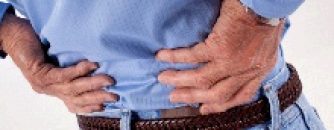Low back pain is the second most frequent reason people see their doctor, trailing only colds and flu in the number of complaints. Because the lower back supports much of the body’s weight, most people have experienced low back pain at some point in their lives.
 There are any number of causes of low back pain. Aside from illness, people can injure or strain their lower back by moving suddenly, lifting heavy objects, sitting for a long time, overusing their lower backs in general or being involved in an accident.
There are any number of causes of low back pain. Aside from illness, people can injure or strain their lower back by moving suddenly, lifting heavy objects, sitting for a long time, overusing their lower backs in general or being involved in an accident.
Specific Low Back Pain Causes
Sudden pain in the lower back usually is caused by an injury to the ligaments or muscles that support it. Causes of low back pain include:
- Compression fracture – This most frequently occurs in those with osteoporosis or a weakening of the bone structure.
- Herniated disc – This can be caused by repeated motion or vibration or sudden increased pressure on the lower back. Lifting heavy objects or using a machine can damage the disc.
- Osteoarthritis – Usually caused by age, this can affect the joints in the spine. If it occurs in the hips or knees, it can alter posture and result in low back pain.
- Fractured vertebrae – These are caused by a heavy force on the spine, such as might happen in a car wreck or a fall.
- Spinal curvature – This can be caused by conditions such as severe scoliosis.
- Spinal stenosis – This is when the spinal canal narrows, usually due to age.
- Spinal tumor – This is a growth on the spinal cord or nerve roots.
- Bacterial infection – These can affect the spine as a result of IV drug use, injury, an infection somewhere else in the body, or surgery.
Symptoms of low back pain can include cramping, muscle spasms, and stiffness. Pain in the lower back may come on gradually or suddenly, and although movements can make it worse, it generally improves with rest. The pain can be episodic, and during an episode the back can be easily injured again. If the pain extends into the leg below the knee, then it likely is due to pressure on a nerve rather than a muscle injury. Other indications of nerve pressure are a tingling feeling in the legs, leg numbness or weakness, or loss of bladder control.
When to Seek Medical – or Legal – Help
Call a doctor immediately if you experience the back pain with other symptoms of a heart attack, if you can’t move a part of the body, if you have extreme pain, or you feel weakness or numbness in the legs. A doctor should be consulted if home back pain remedies haven’t worked within a few days, if the pain worsens, or if it wakes you from sleep.
If back pain persists longer than a month, a doctor likely will choose to test the lower back using CT scans, MRIs, or X-rays. If the low back pain occurred following activities while on the job, a workers’ compensation attorney can help you gather any medical documentation needed to support a workers’ comp claim.





